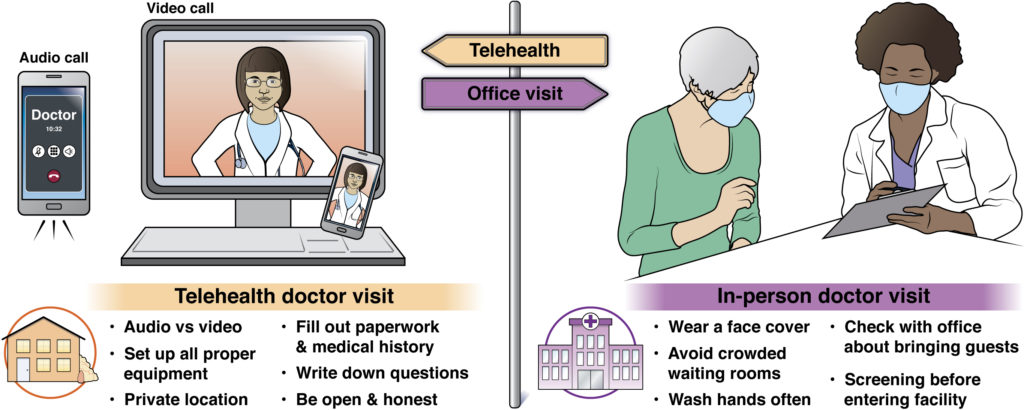During the current pandemic, you might be feeling more nervous, irritable and uncomfortable than normal. These feelings may lead to other symptoms in your body, often digestive or gastrointestinal (GI) symptoms, such as stomach pain, diarrhea or constipation. But, how do you know if your GI symptoms are being caused by an issue in your gut and if you should make a gastroenterology appointment?
It is important to talk to your health care provider and not put off needed medical discussions or visits, either by telemedicine or in person.

Seeking health care during COVID-19
Hospitals and health care providers have re-opened all health care services.
As a patient, how do you know which medical needs you can talk about during a telemedicine visit or when to see a health care provider in their office? How do you know when it is safe to return to health care offices, and what should you expect when you do?
Below are some recommendations to help guide you as you seek treatment for your condition.
- Reach out to your health care provider if you have any questions about when to seek treatment.
- Do not put off needed care. Some patients have not been seeking care for emergency and non-emergency symptoms and conditions. Do not wait to get the care that is needed to help you feel better.
Using telehealth for your visit
Your health care provider might want to have a “telehealth” visit to start. The following tips can help you have a successful visit:
- Find out if your telehealth visit will be audio only (telephone) or audio/visual and if you need to use a computer or smart phone.
- If using video, make sure that your camera, speakers and microphone work, that your health care provider can see you, and your internet connection is strong before the time of your appointment.
- Make sure that you are in a private location where others can’t hear you and you can remove your clothes for any visual exams.
- Fill out your paperwork, have your medical history ready and write out your questions before your appointment.
- Be as open and honest with your health care provider about your symptoms, concerns and problems as you would in their office.
Visiting your health care provider's office
Talk with your health care provider about your provider’s facilities and the precautions they are putting in place to keep patients safe. Health care providers are preparing to care for you safely. You may be asked to do the following by your provider:
- Wear a face cover. A face mask helps limit your risk of getting or spreading disease.
- Avoid crowded waiting areas. Sometimes you will be asked to wait in your car until your visit. Waiting rooms should have chairs spaced far apart to keep you and others safe.
- Limit people who go to your appointment with you to one person. Visitors should also wear a face cover (face mask).
- Screening before entering a facility. You, and your visitor, may have your temperature taken, or be asked questions about your health status, before entering a health care office.
- Wash your hands often. Use soap and water for 20 seconds, or hand sanitizer when you cannot wash your hands.
Precautions are being taken to make sure your care is safe and that you are protected. Patients should have trust in seeking care. Your health care providers are doing their best to keep you, your family and your community safe.


